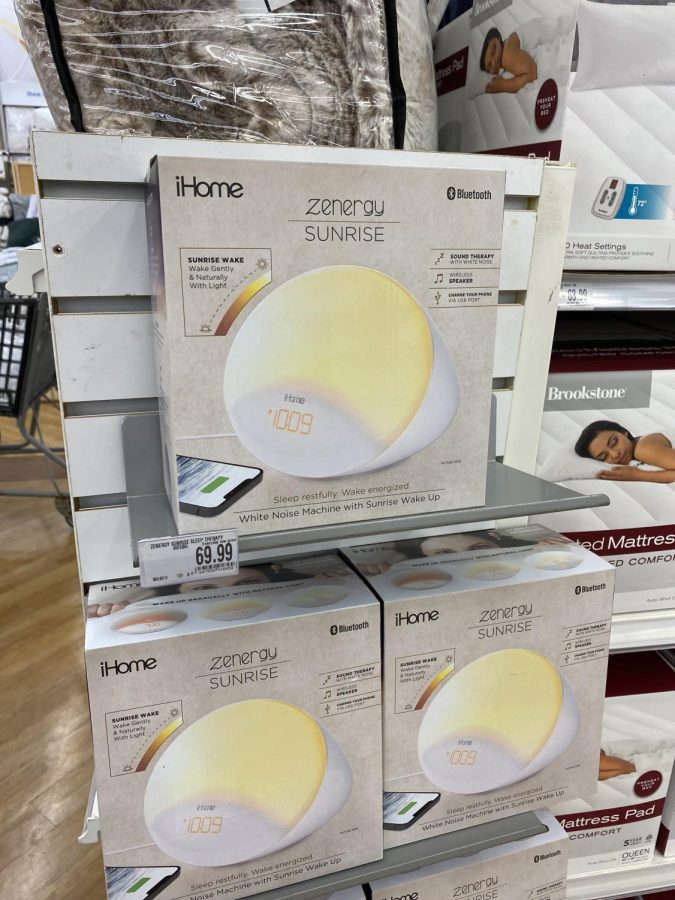Here’s how to stay healthy during the holidays
A $69.99 sunlight lamp at Bed Bath and Beyond. Many different styles are also available through online retailers, like Amazon
January 24, 2022
Soon, we will be waking up with subzero temperatures and feet of snow on the ground, but along with this we get the holiday season. Although the holidays are a time of relaxation and enjoyment, it is often a time people forget to take care of their own health. Here are some tips to stay happy and healthy.
Get exercise
As tempting as it is to sit on the couch with a movie and cup of hot cocoa, it is important to still get some exercise. Getting as little as 30 minutes a day for five days a week can still be beneficial (CDC). This could be as simple as taking a walk every day, or developing a strict gym regiment. There are also lots of local walking paths that are beautiful during the winter (like Kensington Metropark or the Storywalk trail at the Highland Library). If you do go outside, make sure to dress appropriately because the last thing you would want is to wear down your immune system, making it more susceptible to catching a cold, or even falling ill with something severe like hypothermia. Shoveling snow for your family or neighbors is another way to get fresh air and exercise, but know your limits, and do not become too ambitious and exhaust yourself.
Eating habits
More family meals often coincide with lots of food, so it is helpful to beware of what you are eating. Homemade foods are more nutritious than processed foods, because they lack the sugars and salts needed to preserve the store bought/prepared dishes. It is also important to eat in moderation, so then you can go all out for a few meals, but not every one. A balanced diet should have two servings of vegetables and two servings of fruit. Also make sure to focus on hydration. During winter people will forget to drink since it is not hot outside, but hydration is important as ever. Try to set a goal of how much to drink in a day. There are methods proportional with age/weight/gender, but a general goal for most people should be at least 64 ounces (eight cups).
Prioritize mental health
With cold weather, and little to no natural sunlight, winter can be a dark place for everyone mentally. The cold makes getting out more challenging and many people find it harder to make plans. The lack of sunshine will also bring down your Vitamin D levels, so maybe think of investing in a sunlight lamp (also known as a SAD lamp or light therapy box) or taking a Vitamin D supplement.
The SAD lamp mimics the sun, which helps regulate the release of the sleep hormone melatonin, and also serotonin levels. Lack of serotonin can cause sleep trouble, anxiety, and depression. Seasonal Affective Disorder (SAD) can have serious symptoms that include fatigue, depression, hopelessness, and social withdrawal. It affects at least three million people per year in the United States alone and in different ways for everyone. Some people will experience depressive episodes, while other people only feel a general sense of being down and sluggish (bu.edu). If you are experiencing any of these symptoms, talking to a counselor or therapist could be very beneficial.
Sleep schedule
During break, everyone is prone to staying up later and sleeping in longer, but it is a good time to restore your sleep schedule.
With nowhere to be and having work/school off, you are given time to get into a routine, which your body will thank you for in the future.
During the winter, it is best to be awake for all of the hours the sun is out, because it is dark and gloomy, and as previously covered, sunlight is beneficial for our mental health. Keeping blinds open in the house during the day is good, even if it is cloudy outside (sleepdoctor.com). Most doctors recommend that teenagers should get eight to ten hours of sleep each night. Even though that is almost impossible to obtain while trying to balance school, work, and a social life, avoiding screens an hour before bedtime will make it easier to fall asleep once you get to bed.
Even though there are very few people who can successfully balance responsibilities and get enough sleep, it is still a good idea to strive for, because better sleep helps with mood and behavior regulation (NWC).
The key to staying healthy through the winter holidays and beyond is to remember to prioritize yourself and your physical and mental well being.






